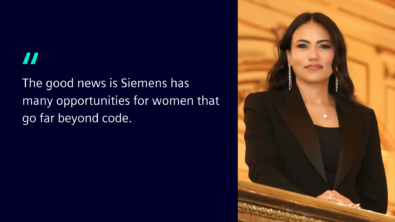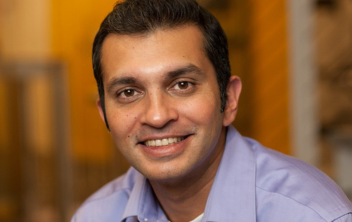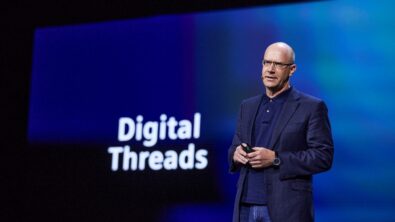Stephen Ferguson
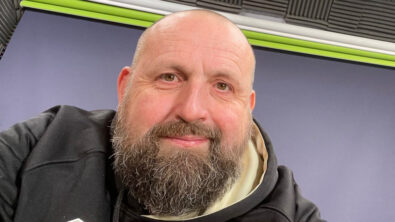
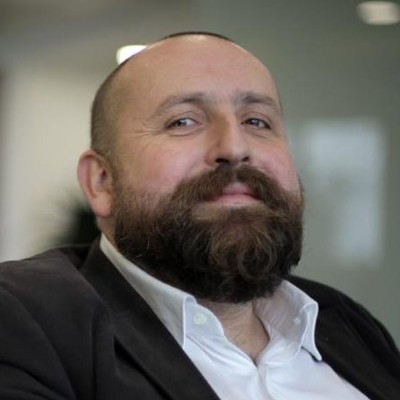
Stephen Ferguson defies expectations. He’s a burly 6’2” with an impressive beard and looks to be built for rugby, though he’s run the world’s six most prominent marathons. He’s a trained engineer and counts among his real-world accomplishments CFD work (using software that would eventually wind up in the Siemens portfolio) on the iconic sail-shaped Burj Al Arab hotel in Dubai, though he’s morphed into one of the most generative marketers and storytellers at Siemens, where he’s best known for his periodic viral blog posts. And though many technologists scorn civic life, Stephen is something of an ascending star in local star U.K. politics. Here he talks pragmatic problem-solving, personal fulfillment in public life, and finding himself in the midst of one of the biggest running stories of the past decade.
So you’ve gone viral a few times…
Stephen: A few years ago, there was a well-publicized effort to break the two-hour marathon record…a big deal in the running world. The short version: one of the world’s elite runners, Eliud Kipchoge, at a motor racing track in Italy with all sorts of attempts at control and optimization – special shoes, pacers and a car in front with a big digital clock, which some on the internet thought was kind of cheating because of the way the car and clock perhaps reduced aerodynamic drag. So with a colleague, I ran a few CFD simulations in STAR-CCM+ and wrote up the results on LinkedIn. Turns out the bigger gain was from the well-placed relaying pace runners. I put the post on Twitter and tagged a few sports scientists I know. By that afternoon, the post had 100,000 views. Before it was over, we’d been interviewed by Runner’s World in a big feature article about the whole $50 million experiment as on-the-record Siemens engineers explaining the real story. I loved bringing simulation and Siemens into story so many people were talking about.
Is this a marketing best practice then?
Stephen: I don’t know…it’s hard to do repeatedly. You need the idea in the first place, then the execution, and maybe a little luck. I’m most proud of the ideas and happy to have the support to run with them. The most-viewed post I’ve written recently is “Apollo 13: The First Digital Twin.” The idea for that came when I was queuing up in line for Mission: SPACE at Disney World in Orlando. You never know what’s going to work.
Your blog posts are meaty – a few thousand words long, reading times in excess of 10 minutes – and fun to read. Obviously not a casual hobby. How did you move from engineering to writing?
Stephen: I wanted to be a journalist but had an English teacher who said, ‘no, you wouldn’t enjoy it.’ So when it came time to my A-levels, I did maths and physics and wound up being an engineer. I learned to program before then, when I was maybe 12 or 13, on the ZX Spectrum computer. There were magazines full of command prompts or TV shows that would play software encoded as a sequence of pulsed sounds that you could record on cassette tapes and then load onto the computer to play games. Basically, if you weren’t scared to muck around and change things, you could actually use the computer, which is probably the biggest inspiration for my career, actually. My inspiration as a writer is Douglas Adams. “Hitchhiker’s Guide to the Galaxy” is the first book I ever properly read as a young adult, but I love his nonfiction stuff more. I think I’ve read every single word he’s written.
Looks like your creativity extends to your career trajectory too. Can you talk about the path you’ve taken, also give some perspective to younger colleagues who have never experienced a downturn?
Stephen: I graduated with my aero engineering degree in 1993, in the middle of a recession. Among my graduating cohort, almost nobody got a job. I’d studied structures and stress though the first job offer I got, after six months, was in CFD, which I’ve been doing ever since. It was a civil engineering firm that was working on the Burj Al Arab hotel, and I spent a couple of years running various simulations – of the air conditioning system and so on. As for perspective, volatility is not behind us. But while recessions are scary, they are also opportunities. I’m confident in the resilience of our industry, especially given the longer-term trend related to energy efficiency and reduced carbon emissions that sit atop the business cycle. Basically, it’s not just new engineering problems to solve but redoing old solutions as well, only this time, without using oil and gas. It’s really an exciting time to be an engineer and it’s going to be a glorious golden era for engineering simulation.
Reading the news, it doesn’t always seem like a glorious golden era in politics, though you’re an elected official and a passionate one at that. Was politics always part of the plan?
Stephen: It was completely accidental. I wanted to start a parkrun when I moved to St. Neots. The run would go through communal lands so I had to go to various different councils for permission. I wound up standing for election to town council and won, then moved up twice, winning elections for district and county councils. I’m independent, not aligned with a party, and I love helping people and solving problems, and being an engineer and understanding technology is hugely helpful here. Whenever I’m faced with a difficult decision, if I can’t make my mind up, it’s usually because I don’t have enough information. So I go and look for more information, and that’s what engineering has taught me. I don’t think there are enough engineers in politics The next level would be an M.P. in the House of Commons. No one has ever done that as an independent, but I think the world is changing. Party politics, where you automatically assume that everything the opposition does is wrong, is ridiculous and makes no sense. I’m exhausted but fulfilled in a way I’ve never been before.
QUICK TAKES
Anything about you that might surprise colleagues?
I’m a runner, even though I’m 6’2” and am not going to say how much I weigh.
Book, podcast and music recommendations?
Book: “The Salmon of Doubt” by Douglas Adams. Podcast: Malcolm Gladwell’s “Revisionist History.” Music:
Genesis and Phil Collins.
One technology you could live without and one you wish we’d hurry up and invent?
I could live without broadcast TV. I wish we’d invent reliable, clean energy, which might be newer, safer nuclear. Did you know that, per gigawatt hour, more people die falling off wind turbines than from nuclear accidents?
Best part of living where you do?
St. Neots is rural, green, and we have the beautiful River Great Ouse that runs through town. A while back, I walked the whole 150 miles of the river for charity in eight days.
MORE
Stephen is an avid podcaster too, both as host and guest. Below, hear him interviewing Nottingham University’s Professor Donal McNally on Episode 10 (Solved with Simcenter: the mystery of a hit-and-run cycling accident) of the Siemens “Engineer Innovation” podcast; which he’s also blogged about here.
And here he is on the “What’s Next” podcast, hosted by U.K. journalist Katie Ridley, talking about how becoming mayor of St. Neots has impacted his life…also dealing with internet trolling and opening up on imposter syndrome.
